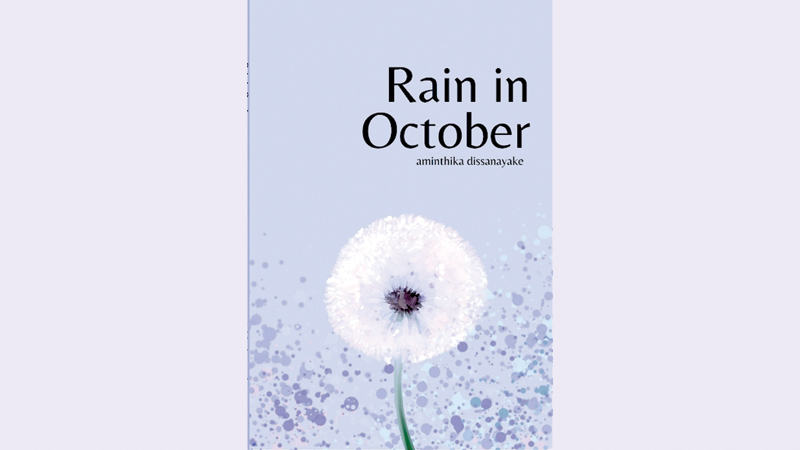Author: Aminthika Dissanayake
Publisher: Dharshana Publishers
Reviewed by Kamala Wijeratne
Aslim volume of poetry, comprising 55 poems is Aminthika Dissanayake’s latest publication. Long ago when she was still a child, I had the honour of reviewing her poetry. The promise shown then, has now blossomed into profound experience and mature insights in well-crafted poetry. The contexts she creates and the emotions she expresses are well beyond her age.
The selection of the title itself – Rain in October is suggestive of the broad span of the contents within. In our youth, in the geography lessons, we learnt that October is a dry month – the month between – the monsoon that is blowing away in September and the monsoon that blows in November. It is a period of transition. So are Aminthika’s poems. Some delve into depths which are reflections of great maturity and wisdom, while others are still of the teen that she is.
For Aminthika, October is a month of hope, of fulfillment:
‘Glancing up at the heavens,
Hoping against hope when
The clouds fill the sky
That they wouldn’t roll away again
Or cast down torrents and lightening
But fulfill and satisfy us like the
Rain in October’
What is unexpected and spontaneous is treasured. The poems in the collection reflect a young woman’s perception of the world around her, its wants and strengths, corrosions and purities. Some poems are long, some short. Their perspectives are broad, their range varied covering the elements, human experiences, and emotions and the daily drudge of life. Some poems are very short, resembling the precision of the haiku. Take, for example, the poem titled
Blue:
You locked the door
And wept
When no one knocked
It seems so simple, so ordinary. But the human situation condensed to a miniscule is so powerfully expressive, so deep in meaning.
It is tempting to write on each and every poem, but then it will go beyond review, into critical overview. So, one has to be selective. Thematically, the poems broaden from everyday routines to the universal. There are the very light pieces like 3.a.m. where she humourously comments on a young student’s struggle with her studies. The last poem in the selection deals with her vision of the Poet and poetry. She announces her creed:
‘I am a poet
I’m only here to gather things
To fill my writing with’
A simple creed, to gather things – to store experience. No political or social roles like Lakdas. She is open to the world. Every event, every object is a stimulus.
She repeats:
‘I am a poet
I’ll take life’s lemons
And write stories
In invisible ink’
She responds to life’s events and absorbs them and stamps her poems with an element of mystery.
But she is aware of the stark realisms of life and opens them up. In the gifted ones, she presents a situation very common to Sri Lanka, specially true of the education system: the Padding up or building up of individuals through artificial means like tuition, favouration, nepotism, what have you! Her character’s cry here is a cry to be left alone to grow up by one’s own effort without being propped up. She ironically presents the character as unable to swim. The falsity of ‘make believe’ is exposed. Without being allowed free growth, the ‘gifted one’ becomes totally helpless:
‘But now we come upon real battles
Sailed into open seas
And everyone has learnt already through trials
To stay afloat
But what about me?
I must learn mid – battle everything
From the beginning
Because you’ve set me up
Even when I never learned
How to win…..
The poem ‘The words of a weary solder’ is another poem that delves deep into human psychology. The soldier is war weary:
“I only go to war to end it’ he says.
He has no fear of losing, His chosen journey of life – was broken by the call of arms.
He only fought,
‘to see the fighting ends’
Life has moved on, leaving him on a battlefield ‘locked in starch’
In very simple words, but with a stark succinctness she suggests the tragedy of war.
Aminthika’s concerns with the environment is also powerfully expressed. The poem ‘the last tree falls’ is a telling comment on the devastation of forests. The situation is dramatically etched – Far away are the new towns, building after building – the concrete jungle. Here and now, on the spot is:
‘wooden carcass
Now forgotten’
The human vandalism is projected in the “sprawling buildings” which has taken the place of trees. The result is:
‘the dust path burns’
Fire and dust; the burning earth. Her vision is penetratingly mature.
In the ‘metamorphosis’, she captures the bare paradox of life – that change is no change – Change is going back to square one. So much clamour, so much noise, but the metamorphosis is going back to the old system.
‘You lie in the wreckage of your past selves’ she says. She compares transformation to ‘a moth’
Yu ‘drift down
Until you’ve taken back to where
You began’
What more profundity could you seek from a poet? And an eighteen year old in that. In her mastery of the English language, in her deep insights into life and the succinctness with which she crafts her poetry, Aminthika is surely heading towards greatness in her chosen art.









